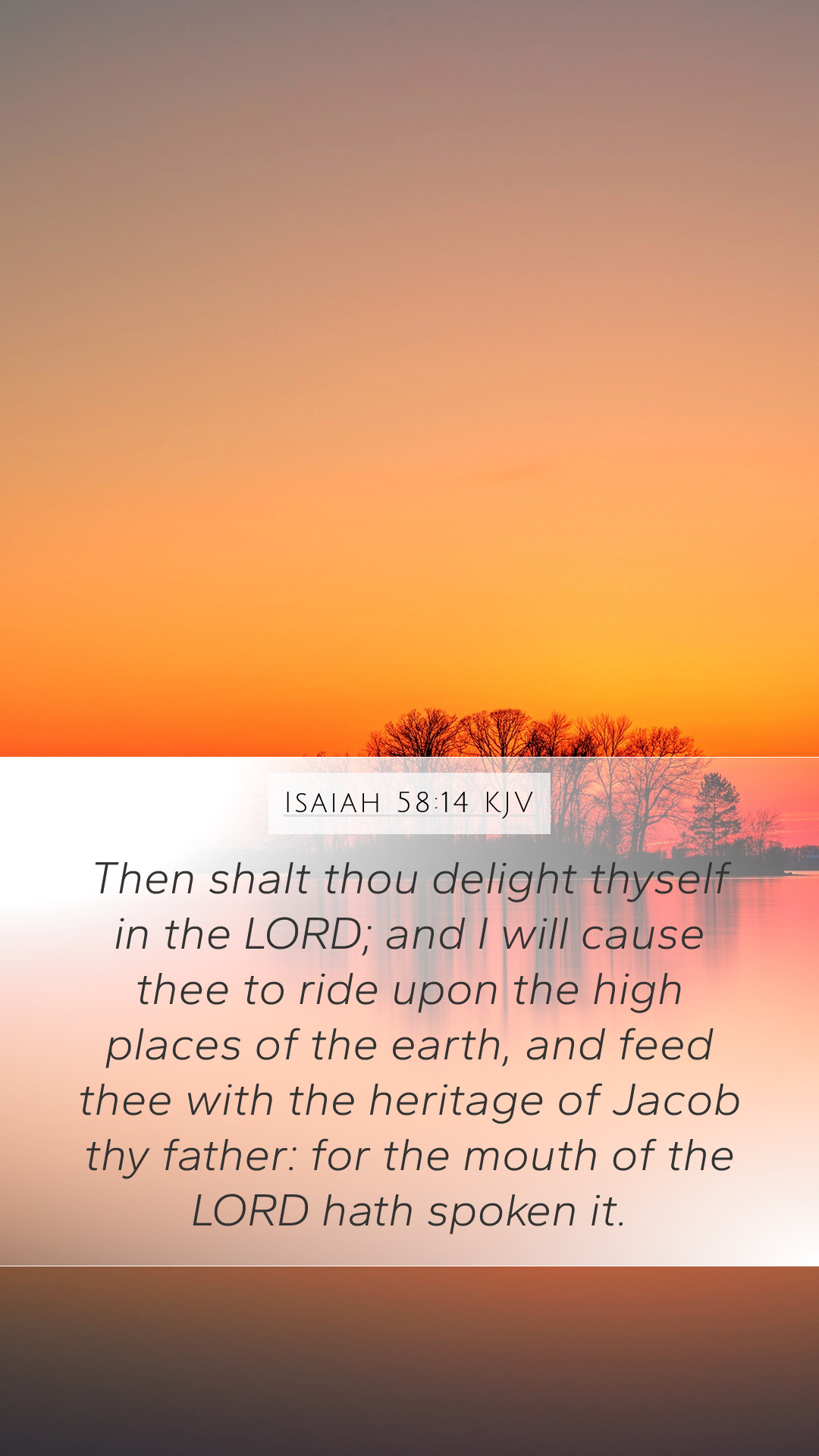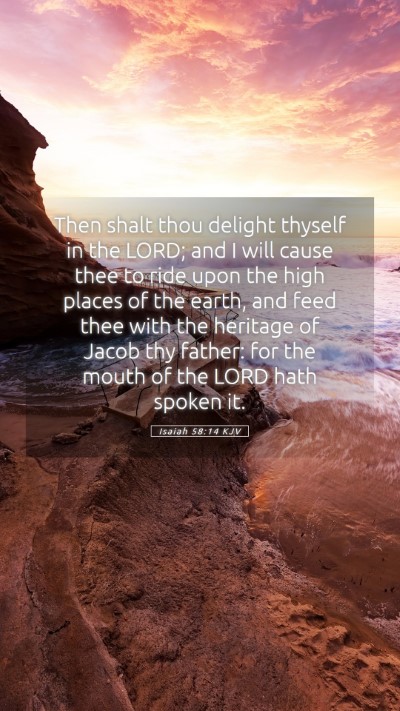Understanding Isaiah 58:14: A Comprehensive Guide
Isaiah 58:14 states:
"Then shalt thou delight thyself in the LORD; and I will cause thee to ride upon the high places of the earth, and feed thee with the heritage of Jacob thy father: for the mouth of the LORD hath spoken it."
This verse is packed with meaning and implications, reflecting not just a promise but also a depiction of the conditions that lead to divine favor. Below, we explore the interpretations and insights provided by various public domain commentaries.
Analysis of Key Phrases
-
Delight in the LORD:
This phrase indicates a deep and genuine satisfaction found in a relationship with God. According to Matthew Henry, this joy comes from worshiping God and aligning oneself with His will, which contrasts starkly from merely performing rituals.
-
Ride upon the high places of the earth:
Adam Clarke interprets this metaphor as a promise of elevated status and spiritual victory granted to those who seek God earnestly. It suggests that their lives will be marked by triumph and prominence in righteousness.
-
Heritage of Jacob:
The reference to 'the heritage of Jacob' reflects God's covenant promise to Israel. Albert Barnes notes that this heritage symbolizes the blessings and sustenance provided by God, highlighting His faithfulness to His people throughout history.
-
For the mouth of the LORD hath spoken it:
This closing phrase asserts the certainty and authority of God's promises. The statement embodies the reliability of divine assurances, as commented by Matthew Henry, emphasizing that what God declares will inevitably come to pass.
Thematic Overview
The themes within Isaiah 58:14 connect to several broader biblical principles:
-
Divine Blessings:
Those who turn towards God in sincerity will receive goodness and bountiful blessings, aligning with the overall context of Isaiah 58, which critiques hollow worship and emphasizes true devotion.
-
Righteousness and Reward:
The promise of high places symbolizes spiritual elevation and recognition of righteousness. Albert Barnes elaborates on the concept that true alignment with God’s intentions ensures spiritual reward.
-
The Importance of Intentions:
God seeks authenticity over mere rituals. Adam Clarke stresses that genuine worship that comes from the heart is what attracts divine favor.
Application of Isaiah 58:14 in Daily Life
Understanding this verse goes beyond intellectual insights; it calls for practical application in our lives:
-
Prioritize Spiritual Growth:
Develop a personal relationship with God, seeking His guidance through prayer and worship, which aligns with the idea of finding delight in the LORD.
-
Respond to God's Call:
By engaging in acts of kindness and mercy, believers can embody the principles of authentic worship and service to others, reflecting the true spirit of the passage.
-
Trust in God's Promises:
Take comfort in the assurance that God will provide for those who earnestly seek Him, as emphasized in the heritage of Jacob.
Cross References
This verse connects with several other biblical passages, enriching its meaning:
- Psalm 37:4: "Delight yourself in the Lord, and He will give you the desires of your heart."
- Deuteronomy 28:1-2: "And if you faithfully obey the voice of the Lord your God, being careful to do all His commandments that I command you today, the Lord your God will set you high above all the nations of the earth."
- Matthew 5:6: "Blessed are those who hunger and thirst for righteousness, for they shall be satisfied."
- James 4:8: "Draw near to God, and He will draw near to you."
- Jeremiah 29:11: "For I know the plans I have for you, declares the Lord, plans for welfare and not for evil, to give you a future and a hope."
Conclusion
Isaiah 58:14 presents an enriching perspective on the relationship between humanity and the divine, emphasizing the significance of authentic worship and trust in God’s promises. This passage serves as a guide for individuals seeking to deepen their faith and understand the broader implications of their spiritual journey.
By engaging with this verse through the lenses of various public domain commentaries, we can glean insights that illuminate our understanding of Scripture, helping to bridge the gap between ancient texts and modern applications.


